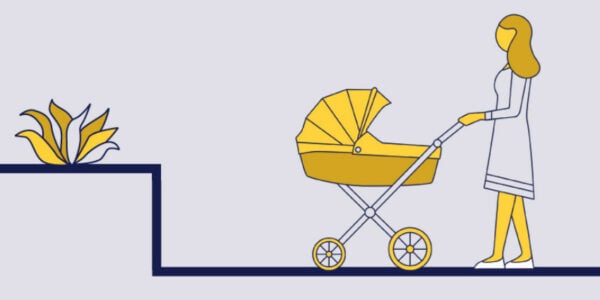About this blog
Nuffield Family Justice Observatory’s recently published research on recurrent care proceedings, carried out by the Family Justice Data Partnership – a collaboration between Lancaster University and Swansea University – revealed that mothers in England and Wales who appear in a first set of care proceedings still have the same probability of returning to court for subsequent (recurrent) proceedings as they did when earlier benchmark studies were carried out.
The report notes that a range of intensive, therapeutic preventative services have been developed to meet the needs of parents who have experienced recurrent care proceedings and evaluations show these have made a difference. However, there are relatively few such services available, access to them is unevenly spread, some have closed due to insufficient funding or budget cuts and many have small teams providing support to only a limited number of women and men. The researchers comment that that the level of support available is insufficient to meet the need.
We will be publishing four blogs in response to the latest research findings and the recommendations in the report.
This Blog is written by Ellen Marks, Director of Practice & Learning at Pause. Pause provides services across England for women who have lost children through care proceedings. In this blog, Ellen supports the call in the research for much improved local information on the numbers of parents experiencing recurrent proceedings and for all local authorities to provide support to parents following the removal of children through care proceedings.
As the overall rates of children being taken into care across England and Wales increase it could make for disheartening reading to also see from this research that the rates of women having repeated children removed from their care remain stubbornly the same over the past decade. This is despite the range of services developed to meet their needs. It is too simplistic, however, to be disheartened and think that these services haven’t made a difference.
We know Pause, and services like Pause, make a difference in preventing women having further children removed from their care. So, given the increase of services like ours, why this disconnect? Why are we not seeing a national impact on the numbers of women and children experiencing repeat removals?
I think there are two things going on. Firstly, whilst Pause started in hackney in 2013, and was first tested in six areas in 2015-17, it wasn’t until the later part of 2017/18 that our wider roll out happened – therefore the impact might not be seen in the data yet. I know this is similar for lots of other service who work with parents who have experienced having children removed from their care as well. Secondly, and I think most importantly, Pause, and many other services, work with women who have already had children taken into care. That’s the community of women we have an impact on – not those for whom it hasn’t yet happened. The evidence base for Pause, independently gathered and robust, clearly demonstrates that our model of a trauma- informed, relationship- based intervention works and delivers outcomes, including reducing the number of infants entering care in areas with a Pause Practice.
But we don’t work with women before they have had children removed – and to me that’s what this research is showing. That there are simply more women and families coming through the system. Families experiencing the impact of entrenched trauma, families impacted by 12 years of austerity and cuts to local early help preventative services, and on top of that families now struggling with the impact of the pandemic and cost of living crisis. These are the women our services are not yet working with
So, could Pause work with women even earlier than we and many other services do? Could we identity women and families who are likely to be caught in this cycle in the future and help them before it becomes a problem? We think it’s possible but, as yet, we do not have the capacity or resource to test this.
We also think that a more joined up approach to parents when they have a child removed would help. We would like to see a local Post Proceeding Panel set up for all parents when care proceedings conclude and decide that a child/ren will be removed permanently. We know that when this happens parents are traumatised – they feel angry, confused, devastated, and ashamed. Who is there to think about and support them, so that it isn’t repeated again and again and again? We recommend a panel for each local authority, (modelled on MARAC) that would be responsible for coordinating robust joined up support available to all parents where child/ren are removed with a named key professional who is responsible for the plan. In areas there is a Pause Practice or similar service this would most likely be that service, in areas where there are not then this could be an adult social worker, a mental health key worker, a domestic violence worker , substance misuse worker or other. The important thing would be that the birth family is not simply lost without support.
But before we can do any of this, we need to make sure we know the size of the problem. There are still many local authorities who cannot answer the question of how many mothers (and fathers) have had multiple children removed from their care. For any progress to be made this absolutely has to change. We cannot even begin to address the needs of these children and families without counting them and seeing them. I’m a children’s social worker with 25 plus years frontline statutory and non-statutory experience, all around the care system. I’ve been the manager of an inner-city hospital based social work pre-birth team. I have been one of the people who literally walks out of the hospitals with babies who are being taken into care. It’s not easy, but it is and will always be necessary for some children to keep them safe. But I’ve removed baby number 4 from a 21-year-old care leaver, and I’ve been involved in the proceedings for children numbers 14 and 15 from another woman.
Something clearly isn’t working – care proceedings should be an alarm bell to all professionals working with a family, including the adults, that help being provided isn’t working in the way it is intended. We, as social workers and other connected professionals, need to brave enough to acknowledge this, and not just blame it the system – we are the system.
I came into social work to keep children safe and support families to do this. The research published today shows that we are not getting it right. Pause, and other similar services are making a difference. However, at the moment, it is postcode lottery about whether a specialist service exists in an area or not. Or even if a local area knows they have a need for a service like Pause. If we want to be here in another decade looking at different and better statistics, this needs to change.







